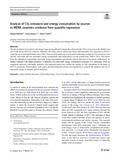Analysis of CO 2 emissions and energy consumption by sources in MENA countries: evidence from quantile regressions

View/
Date
2021-03Author
Alharthi, M.
Dogan, E.
Taskin Yesilova, F.D.
Metadata
Show full item recordAbstract
The development of economies and energy usage can significantly impact the carbon dioxide (CO2) emissions in the Middle East and North Africa (MENA) countries. Therefore, this study aims to analyze the factors that determine CO2 emissions in MENA under the environmental Kuznets curve (EKC) framework by applying novel quantile techniques on data for CO2 emissions, real income, renewable and non-renewable energy consumption, and urbanization over the period from 1990 to 2015. The results from the estimations suggest that renewable energy consumption significantly reduces the level of emissions; furthermore, its impact increases with higher quantiles. In addition, non-renewable energy consumption increases CO2 emissions, while its magnitude decreases with higher quantiles. The empirical results also confirm the validity of EKC hypothesis for the panel of MENA economies. Policymakers in the region should implement policies and regulations to promote the adoption and use of renewable energy to mitigate carbon emissions.

DSpace@YASAR by Yasar University Institutional Repository is licensed under a Creative Commons Attribution-NonCommercial-NoDerivs 4.0 Unported License..













